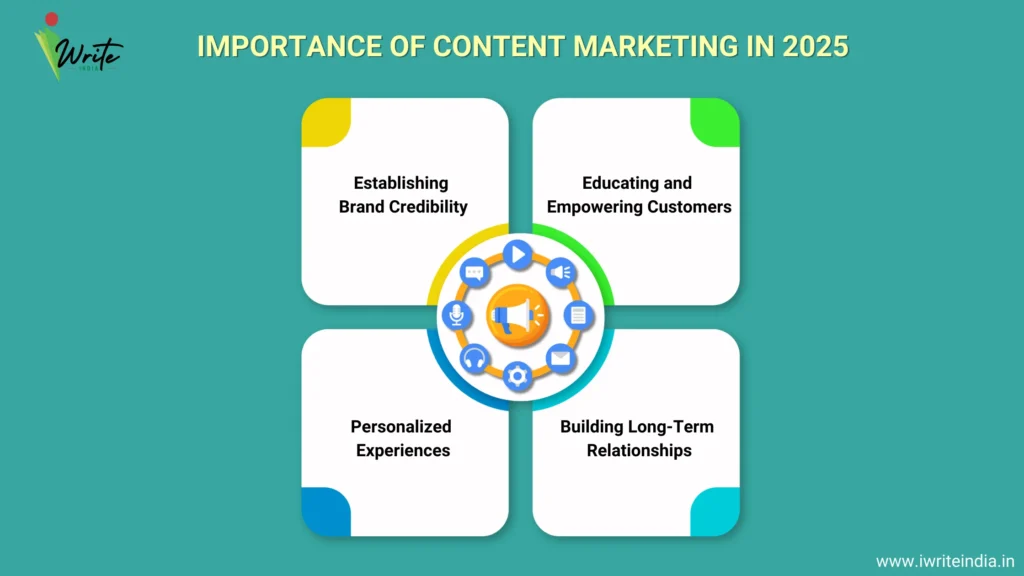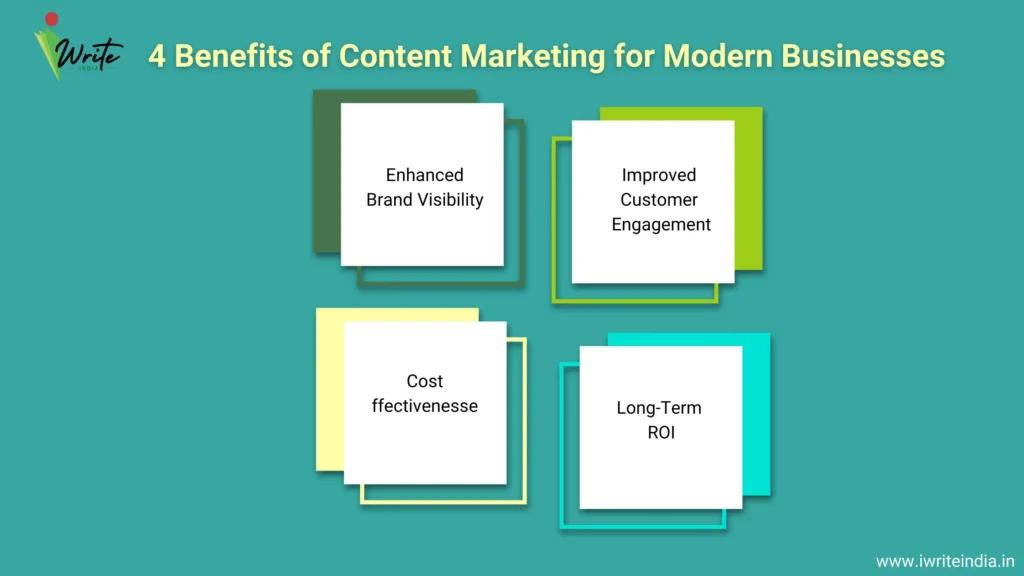Content marketing has reshaped how brands communicate, build trust, and drive conversions. In 2025, content marketing will evolve into a sophisticated, tech-driven practice that focuses on delivering genuine value. Whether you’re a startup, an established brand, or an entrepreneur, content marketing remains a cornerstone for digital success.
What is Content Marketing?
Content marketing focuses on crafting and distributing content that is meaningful, relevant, and consistently delivered to captivate and engage a targeted audience. Instead of relying on hard-selling techniques, it focuses on building trust and encouraging customers to take action naturally.
From blogs and social media to podcasts and webinars, content marketing keeps brands connected with their audience while ensuring they remain meaningful and competitive.
The Importance of Content Marketing in 2025

In today’s digital-first world, businesses are vying for consumer attention across countless platforms and channels. The sheer volume of information available online has created a phenomenon known as “digital noise,” where audiences are inundated with ads, posts, and messages vying for their time. Amidst this chaos, content marketing serves as a beacon of relevance and trust.
By focusing on providing genuine value, content marketing cuts through the clutter, helping businesses connect with audiences on a deeper level. In 2025, this connection is more crucial than ever, as consumers increasingly demand authenticity and personalization in their interactions with brands.
1. Establishing Brand Credibility
Content marketing enables businesses to showcase their expertise and establish credibility within their industries. Informative blogs, insightful whitepapers, and engaging videos position brands as thought leaders, fostering trust among their target audience.
According to a 2025 HubSpot study, 88% of marketers agree that content marketing significantly contributes to brand credibility. This trust not only draws in customers but also fosters their loyalty to the brand.
Example: A technology company publishing regular guides on cybersecurity trends becomes a go-to resource for businesses seeking reliable information. This establishes trust and enhances its market reputation.
2. Educating and Empowering Customers
Consumers today are proactive; they research extensively before making purchasing decisions. Educational content, such as tutorials, how-to guides, and case studies, empowers customers by addressing their questions and solving their problems.
In fact, 75% of customers in 2025 prefer buying from brands that offer educational content. By being a reliable source of information, businesses foster loyalty and increase their chances of converting readers into buyers.
Example: A fitness brand that shares workout plans, nutrition tips, and health advice not only engages its audience but also positions itself as a partner in their wellness journey, boosting customer retention.
3. Personalized Experiences
By 2025, personalization has shifted from being a choice to an absolute necessity. Content marketing enables brands to deliver tailored experiences that resonate with individual preferences and needs. By leveraging AI and data analytics, businesses can provide content that feels uniquely crafted for each customer.
Why it matters: Personalized content enhances customer satisfaction and increases engagement. A study by McKinsey found that businesses focusing on personalization see revenue increases of up to 40%.
4. Building Long-Term Relationships
Content marketing is not about making a one-time sale—it’s about cultivating long-term relationships. Valuable content fosters ongoing engagement, ensuring that customers return for more. Over time, this creates brand advocates who promote your business organically.
Example: A financial planning firm that publishes weekly insights on investment strategies keeps its clients informed and engaged, building trust and fostering referrals.
Content Marketing Statistics: Insights for 2025
In 2025, content marketing will continue to be a cornerstone of successful digital strategies. Understanding the data behind its impact can help businesses refine their approaches and capitalize on emerging opportunities. Here’s a closer look at the key statistics that highlight the value and influence of content marketing in today’s digital landscape.
1. Widespread Adoption of Content Marketing
- 91% of businesses report actively using content marketing as part of their overall marketing strategy (Source: Content Marketing Institute, 2025).
- 70% of marketers invest in content creation, making it the most prioritized marketing channel.
These numbers highlight the necessity of adopting a strong content marketing strategy to maintain a competitive edge.
2. ROI of Content Marketing
- Businesses that prioritize content marketing experience a 13X higher ROI compared to those relying solely on traditional marketing tactics (Source: Demand Metric).
- 61% of marketers believe content marketing drives more leads than paid advertising (Source: HubSpot, 2025).
The affordability and lasting advantages of content marketing make it an essential resource for businesses of every size.
3. Consumer Preferences for Content
- 75% of consumers prefer to engage with brands that provide valuable educational content over brands that focus on direct promotions.
- 47% of buyers view three to five pieces of content before engaging with a sales representative (Source: Gartner).
These statistics highlight the critical role of content in influencing purchase decisions.
4. The Role of Visual and Video Content
- By 2025, 84% of all internet traffic is expected to come from video content (Source: Cisco).
- Articles with images receive 94% more views compared to those without visuals (Source: HubSpot).
The dominance of visual content shows the need for businesses to incorporate engaging videos, infographics, and high-quality images into their content strategies.
5. Mobile Optimization is Key
- Mobile devices now account for 68% of all web traffic.
- Mobile-optimized content generates 4.8x higher engagement compared to non-optimized content (Source: Statista).
With the growing dominance of mobile usage, optimising your content for mobile devices has become essential.
6. Personalization Drives Success
- Personalised content delivers a 20% increase in sales opportunities (Source: Adobe).
- Personalised content is 2.5 times more likely to elicit a response from consumers than generic messaging.
Personalised content marketing strategies are becoming vital for creating meaningful customer interactions.
7. Long-Term Value of Evergreen Content
- Evergreen content generates 3x more traffic over its lifetime compared to time-sensitive posts (Source: SEMrush).
- Updating existing content improves organic traffic by up to 106% (Source: Backlinko).
Investing in high-quality, evergreen content ensures a steady flow of traffic and leads over time.
8. Social Media and Content Marketing
- Social media is considered the most effective content distribution channel by 60% of marketers.
- LinkedIn generates 80% of B2B social media leads, solidifying its role as a crucial platform for B2B content marketing.
Social media remains an essential distribution channel for maximising content reach and engagement.
9. AI and Automation in Content Marketing
- 56% of marketers use AI tools to optimise content personalisation and delivery (Source: Statista, 2025).
- AI-generated content is projected to reduce content creation time for businesses by 30%.
Automation and AI are transforming how content is created, distributed, and optimised, enabling businesses to achieve greater efficiency.
10. The Impact on SEO
- According to BrightEdge, high-quality content generates 67% more leads compared to low-quality content.
- Businesses that consistently publish blog posts are 13 times more likely to achieve a positive ROI.
Content marketing remains one of the most effective ways to improve search engine rankings and generate organic traffic.
4 Benefits of Content Marketing for Modern Businesses

1. Enhanced Brand Visibility
Content marketing amplifies your online presence. Consistent, high-quality content improves SEO rankings, making it easier for potential customers to find you.
2. Improved Customer Engagement
Through interactive blogs, videos, and polls, content marketing fosters two-way communication, boosting engagement and loyalty.
3. Cost-Effectiveness
Content marketing is often low-cost than paid advertising but delivers longer-lasting results, ensuring a sustainable ROI.
4. Long-Term ROI
Unlike ads that fade away, well-crafted content generates traffic, leads, and conversions for years, creating a compounding effect.
How Does Content Marketing Work – The 3 Stages to Conversion

Content marketing guides potential customers through the buyer’s journey, which includes three primary stages: Awareness, Consideration, and Decision. Each stage requires specific content types and strategies to engage the audience effectively and move them closer to conversion. Here’s how content marketing works across these stages:
1. Awareness Stage: Capturing Attention
The Awareness stage represents the top of the sales funnel, where potential customers are introduced to your brand for the first time. At this point, the audience may not even be aware of their specific problem or need. The goal is to provide valuable, educational, and engaging content to inform and attract their attention.
What Works in the Awareness Stage?
- Blog Posts: Informative articles that address general questions or industry trends.
- Social Media Content: Eye-catching posts, short videos, and infographics to generate interest.
- Infographics: Visual content that simplifies complex information.
- Videos: Explainers or introductory videos to showcase solutions to common pain points.
- SEO Optimization: Ensuring your content is visible on search engines with relevant keywords like “what is content marketing” or “benefits of content marketing.”
Objective:
To make your brand visible and build credibility without direct promotion.
Example:
A SaaS company publishes a blog titled “Top 10 Ways to Streamline Team Collaboration,” targeting users looking for collaboration tools but not yet ready to choose a provider.
2. Consideration Stage: Building Interest
In the Consideration stage, potential customers acknowledge their problem or need and actively search for suitable solutions. They’re evaluating different options, including your competitors. Content in this stage should showcase your expertise, explain your value proposition, and differentiate your offerings.
What Works in the Consideration Stage?
- Whitepapers and eBooks: In-depth resources that dive into solutions for specific problems.
- Case Studies: Real-world examples of how your product or service has solved similar issues for others.
- Webinars and Tutorials: Engaging content that showcases your expertise and highlights your value.
- Comparison Guides: Side-by-side comparisons of your offerings versus competitors.
- Email Marketing Campaigns: Personalized follow-ups with more detailed information about your products or services.
Objective:
To educate your audience about why your solution is the best fit while establishing trust and authority.
Example:
An eco-friendly packaging company creates an eBook titled “How to Reduce Your Business’s Carbon Footprint with Sustainable Packaging.” This positions them as a knowledgeable resource while subtly promoting their product.
3. Decision Stage: Driving Conversions
The Decision stage is when potential customers are prepared to finalise their purchase or commitment. At this point, they’ve narrowed down their options and need reassurance that your product or service is the best choice. Content in this stage should focus on removing doubts, highlighting value, and making the purchase process seamless.
What Works in the Decision Stage?
- Product Demos: Interactive or live demonstrations of your product.
- Testimonials and Reviews: Social proof that reassures buyers about the quality and effectiveness of your offerings.
- Special Offers and Discounts: Limited-time deals that create urgency and incentivise action.
- FAQs: Addressing any lingering questions or concerns directly.
- Landing Pages: Conversion-focused pages with clear CTAs (Call-to-Actions).
Objective:
To provide final reassurance and push the prospect to take action, whether it’s making a purchase, signing up, or contacting your sales team.
Example:
A digital marketing agency offers a free consultation or a limited-time discount on their first campaign, paired with testimonials from satisfied clients on their landing page.
Top 4 Content Marketing Trends in 2025

- AI-Powered Personalization
Artificial Intelligence has transformed content marketing by enabling hyper-personalized experiences. AI tools analyse user behaviour to deliver tailored recommendations, dynamic email campaigns, and customised website content, ensuring each interaction feels uniquely relevant. - Short-Form Video Dominance
Short-form videos on platforms like TikTok, Instagram Reels, and YouTube Shorts have become essential for capturing attention quickly. These bite-sized, engaging formats are perfect for storytelling, product highlights, and tutorials, aligning with consumers’ preferences for quick, impactful content. - Interactive Content Experiences
Interactive formats such as quizzes, polls, and augmented reality demos drive higher engagement rates. These immersive experiences encourage two-way communication, keeping audiences entertained while offering valuable insights to marketers. - Sustainability-Driven Content
As consumers increasingly prioritise eco-conscious brands, businesses integrate sustainability themes into their content. Sharing stories about environmental and social initiatives resonates deeply with audiences and reinforces brand trust.
How to Get Started with Content Marketing
Launching a successful content marketing strategy begins with a clear plan and targeted actions. Whether you’re a startup or an established business, here are four essential steps to kickstart your journey:
1. Define Clear Goals
Identify what you want to achieve through content marketing—increasing brand awareness, generating leads, or improving customer engagement. Goals like these provide direction for your strategy.
Pro Tip: Set SMART (Specific, Measurable, Achievable, Relevant, Time-bound) goals to ensure focused efforts.
2. Know Your Audience
Understanding your target audience is critical to creating content that resonates. Use analytics tools to identify your audience’s interests, challenges, and preferences. Develop personas to guide content creation tailored to their needs.
Why It Matters: A well-defined audience ensures your content marketing strategy is relevant and impactful.
3. Plan and Create Quality Content
Design a content calendar that includes blogs, videos, infographics, and other formats. Focus on delivering value by addressing audience pain points and optimising content with keywords like “what is content marketing” and “benefits of content marketing.”
Tip: Work with a professional marketing agency in Delhi to create high-quality, engaging content that aligns with your brand’s goals.
4. Measure and Optimize
Track the performance of your content using tools like Google Analytics. Monitor metrics such as traffic, engagement, and conversions. Use these insights to refine your strategy and improve results.
Why Hiring a Content Marketing Agency in Delhi Makes Sense

Collaborating with a content marketing agency in Delhi like iWrite India gives you access to experts who understand your market, craft compelling strategies, and handle execution seamlessly.
Local agencies are well-versed in regional and global trends, ensuring tailored campaigns that drive results.
Actionable Tips for Content Marketing in 2025
- Invest in video content and live streams.
- Collaborate with micro-influencers.
- Leverage AI for analytics and optimisation.
- Create content aligned with user intent.
The Way Forward
Content marketing in 2025 is about innovation, personalisation, and staying ahead of trends. Whether you’re new to content marketing or looking to revamp your strategy, embracing these insights will set you apart in a competitive landscape.
Looking for expert guidance? Partner with iWrite India, a premier content marketing agency in Delhi, to elevate your brand’s digital presence. Contact us today for tailored solutions!
FAQs on Content Marketing
How is content marketing different from traditional marketing?
Content Marketing focuses on building trust by providing valuable and educational information to the audience. Unlike traditional marketing, which pushes products or services, content marketing creates a connection through engaging content. This approach establishes long-term relationships and positions your brand as an authority. A strong content marketing strategy is essential for success, especially when working with a content marketing agency in Delhi.
What tools can simplify content marketing in 2025?
Content marketing in 2025 will be made easier with tools like ChatGPT for content ideation, Canva for designing visuals, and Ahrefs for SEO research. These tools help create high-quality content, save time, and improve your content marketing strategy. Agencies like a content marketing agency in Delhi use these tools to ensure their clients stay ahead of the competition and adapt to content marketing trends.
Why is video content crucial in content marketing?
Video content is a vital part of content marketing because it grabs attention quickly and effectively communicates complex ideas. Customers prefer learning about products through videos, which are engaging and easy to understand. Incorporating videos into your content marketing strategy aligns with content marketing trends and helps brands build stronger connections with their audience.
How does content marketing impact SEO?
High-quality, optimized content marketing improves SEO by increasing website authority, boosting organic traffic, and enhancing SERP rankings. A well-thought-out content marketing strategy ensures your content aligns with content marketing trends and includes valuable insights that resonate with the audience. Partnering with a content marketing agency in Delhi can amplify these efforts, ensuring consistent and effective results.
What role does AI play in content marketing?
AI revolutionizes content marketing by personalizing content delivery, predicting trends, and automating campaign management. It helps create data-driven strategies and optimize performance. Integrating AI into your content marketing strategy ensures efficiency and relevance, keeping pace with content marketing trends. A professional content marketing agency in Delhi can leverage AI to enhance campaign success and audience engagement.





